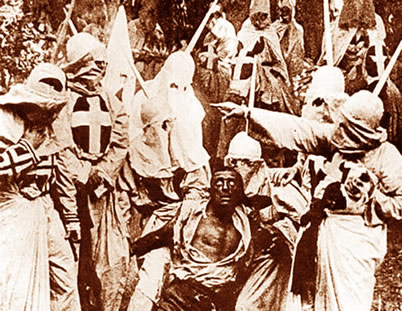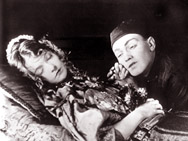Was D. W. Griffith a Racist?
YES!
 But he certainly would have said that he had absolutely nothing against Black people and that's important too.
But he certainly would have said that he had absolutely nothing against Black people and that's important too.
Racists are people who believe that the members of groups they identify as biologically different than themselves share characteristics that place them collectively lower in a hierarchy than the group to which they belong (which they also believe to have a biological basis). Racists believe that society is (or should be) organized to reflect this "natural" order.
By this definition Griffith was undoubtedly a racist (as were a large majority of white people of his era).
Anthropologists agree that racism has no scientific basis. There are no biological human races.
Griffith fought hard to resist modifying the overtly racist elements of Birth of a Nation, rejecting the evidence that these were false and might be injurious to people. He had an absolutely unquestioned belief in the biological superiority of white people and interpreted history and social organization in light of this belief.
HOWEVER, racism is different from hatred. There's no evidence that Griffith personally disliked Black people. He would have protested that he had nothing but love in his heart for Blacks and that his movie showed many instances of affection between Blacks and whites. This was certainly true, BUT it is not the degree of your like or dislike of other people that makes you racist, it's your belief that humans differences are biologically encoded in something called race and that the result is a hierarchy.
 Later in his career Griffith made a movie called Broken Blossoms (1919) based on a short story "The Chink and the Child" (1916) by Thomas Burke. In this film, set in London, a white teen (Lucy Burrows, played by Lilian Gish), abused by her father, turns to a Chinese immigrant (Cheng Huan, played by the white actor Richard Barthelmess) for solace. Huan is unable to prevent Lucy's father from murdering her but kills the father and then himself. Griffith makes it clear that the love between Burrows and and Huan is strictly platonic. The film is clearly racist by today's standards but relatively liberal by those of its era. However, Griffith makes his Chinese character an amalgam of stereotypes: peaceful Buddhist, opium addict, shopkeeper, bound by tradition, etc.. And, of course, has him played by a white actor.
Later in his career Griffith made a movie called Broken Blossoms (1919) based on a short story "The Chink and the Child" (1916) by Thomas Burke. In this film, set in London, a white teen (Lucy Burrows, played by Lilian Gish), abused by her father, turns to a Chinese immigrant (Cheng Huan, played by the white actor Richard Barthelmess) for solace. Huan is unable to prevent Lucy's father from murdering her but kills the father and then himself. Griffith makes it clear that the love between Burrows and and Huan is strictly platonic. The film is clearly racist by today's standards but relatively liberal by those of its era. However, Griffith makes his Chinese character an amalgam of stereotypes: peaceful Buddhist, opium addict, shopkeeper, bound by tradition, etc.. And, of course, has him played by a white actor.
Broken Blossoms may make Griffith slightly more sympathetic to us but does not excuse him at all.
For me, because Griffith not only made Birth of a Nation but assiduously defended it, and because Birth of a Nation is directly linked to the revival of the KKK and the perpetuation of deeply damaging stereotypes and ultimately racism itself, it's hard to think anything positive about Griffith. It's easy to imagine him as a hateful, bad individual. However, his attitudes were typical of many, perhaps most white people of his era. If you're white (or have white ancestry), many people in your family history almost certainly shared Griffith's ideas. Were they hateful or bad people? How do we learn to reject the hateful ideas and bad choices made by our ancestors without rejecting all of our heritage?